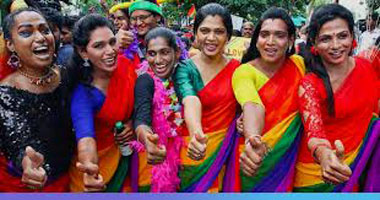NE NEWS SERVICE
NEW DELHI, MAY 30
With just 25,468 (5.22 percent) transgender persons vaccinated against COVID-19 in India till now, activists said misinformation, lack of documents and digital divide have added to their woes in getting inoculated.
According to the 2011 census, there are 4.87 lakh people belonging to the transgender community in India.
A total of 8,80,47,053 men and 7,67,64,479 women have been vaccinated, while just 25,468 people in the ”other” category have been inoculated, the CoWIN portal showed.
The activists said misinformation, lack of digital knowledge and no government documents are the main reasons behind hesitancy of the community members in getting vaccinated.
Transgender activist Pushpa Mai, who is based in Jaipur, said a lot of community members approached her with queries related to vaccination.
“They were misguided. They were told that taking vaccination will make their health worse. We have explained to them that getting vaccinated can protect them from this deadly disease and they should get vaccinated as soon as possible,” Mai said.
Shahana, 21, said she had many reservations about the vaccine earlier but the activists dispelled her fears.
“My friends told me you will die, why do you want to risk your life… but then I asked activists and they told me there is nothing like that and I should get vaccinated as they will give me protection,” Shahana, who works as an office assistant, said.
Another person from the community who is HIV positive said he is not sure if vaccination is safe for him.
Dr Vandana Prasad, a public health professional, said there are no contraindications that people who are HIV positive or have recently undergone surgery can’t get vaccinated.
“There is some misinformation going around that you will die if you take the vaccines. There are some side-effects of the vaccines, including death, but that is a very, very rare event as compared to deaths due to COVID-19. They can speak to their doctors but generally if they are not severely immunocompromised, then they can get the vaccination,” she said.
Some people from the community are eager to get vaccinated but they do not have the necessary documents.
Fifty-year-old Chandni, who earns her living by dancing at weddings and family functions, has been desperate to get vaccinated. Chandni, a diabetic, said she does not have any government documents that are necessary for her to get vaccinated.
“If I go anywhere to perform I am asked if me or my family members have any symptoms or if I have got vaccinated so it is necessary for me to get vaccinated to remain safe and also to earn my livelihood,” she said.
Samina (name changed), 44, who earns her livelihood by begging at traffic signals, does have an Aadhaar card but does not own a smartphone and is hesitant to go for walk-in vaccination fearing discrimination.
“My friend went and she was driven away by the people queuing outside who told her she can”t get vaccinated with them. I want to go with an appointment so no one can say that but with no smartphone that is very difficult,” she said.
Chandni and Samina are now waiting for a special vaccination drive as planned by the government.
The Centre had recently asked states to ensure that there was no discrimination against transgender persons at COVID-19 vaccination centres.
The Social Justice and Empowerment Ministry has also urged the states to conduct awareness drives, especially to reach out to members of the transgender community in different vernaculars to ensure that they are informed and aware of the vaccination process.
The ministry has also requested states to organise separate mobile vaccination centres or booths for vaccination of transgender persons such as those taken up in the states of Haryana and Assam.
Meera Parida, representing the east region in the National Council for Transgender Persons, said she along with her NGO Sakha is planning to organise a special drive for the community members in Odisha.
“There were apprehensions and fears among the community members over vaccination but now the situation is improving and we are planning a special drive for the community members,” Parida said.
NGO Centre for Advocacy and Research (CFAR) executive director Akhila Sivadas said any disease prevention approach requires community involvement.
“This is particularly true for marginal groups such as transgender, who even in the best of times feel unsupported and unaccepted by mainstream society. It is not possible to ensure vaccine preparedness without engaging the community and encouraging them to be part of the solution and find ways to educate and persuade their peers,” she said.












